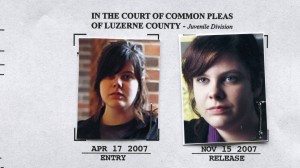

“I wanted them to be scared out of their minds”----the tag-line for Robert May's unnerving documentary “Kids for Cash”--- might just be what the director is wishing for his audience, too. The quote belong to Mark Ciavarella, the corrupt judge and now imprisoned man who sent some 3,000 juveniles of Pennsylvania's Luzerne County to detention centers for “crimes” as petty as making fake MySpace pages. He and Luzerne's former President Judge Michael Conahan also accepted millions in a clandestine “finder’s fee” for providing a construction-buddy the opportunity to build a new detention center.
Hunkering down with the victims, heroes, and snakes of Ciavarella’s Zero-Tolerance reign-of-terror, “Kids for Cash” is the kind of nod-your-head-in-disbelief documentary that almost relishes in the mayhem of the stories it captures. You sense that a little too much in its imaginative fringes. The movie returns to sequences of an empty, dim attic populated by a paper town of happy and literally one-dimensional citizens and children. The shadowy camera glides over them as Michael Brook's menacing music suggests a "Jaws"-like terror is about to smear their crayon-smiles into frowns.
The movie's more effective terror is built by the real people that talk to May and his crew---especially four young adults who struggle with such things as PTSD and drug-abuse following their imprisonment by Ciavarella. “I'm gonna go see a guy with a lot of power and it's not gonna be good for me,” remembers Justin, a smart musician struggling to get into college, as he thinks about the morning of his first hearing. He was 12 years old and stood before the Ciavarella for using foul-language with an adult. His is an eloquent summary of Ciavarella and a lot of that lies in the honest cadence of Justin's voice. How he and the other kids speak---with resonant turns of phrases and concise insights----make “Kids for Cash” a rare kind of movie: the kind with believable teenagers.
But what will undoubtedly stick in viewers' minds most is the footage of Sandy Fonzo, a mother, verbally berating Ciavarella in front of his courthouse press. At the top of her lungs, she informs Ciavarella--and in turn, us--- that Ed, her son, who the judge once-upon-a-time locked up, killed himself after being released from placement. But May's inclusion of this footage is offensive because it sneaks up on us outside the context of the one-on-one relationship we've had with Fonzo up until that point. Previously, she had told her story directly to us, as part of the movie. Here, we learn about that story's tragic ending as voyeurs to her candid protest. May cheapens Ed's death and the anguish of Fonzo's outburst by treating it as a secret and sensational apex of "Kids for Cash". His staged, surprise-twist is scary as hell, but for all of the wrong reasons.
Yet an astonishing photograph of Ed just might save May's narrative bungle: Ed's a boy, his face down-turned, the head of his red ball-cap staring at the camera along with the black-water eyes of the doe he holds--- eyes just as vibrant as Ed's hat and inscrutable as his evasive position. It not only makes you sad for Ed, but for all of the nameless and faceless kids who aren't represented in "Kids for Cash"---the ones who might not have anyone in their corner, or a mother shrieking for them on court steps The photograph draws from you a natural shudder of despair, the kind you have good reason to be scared of.